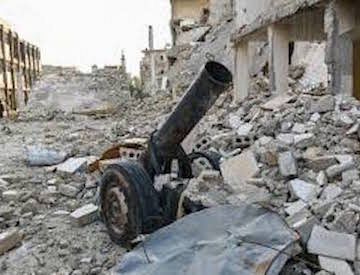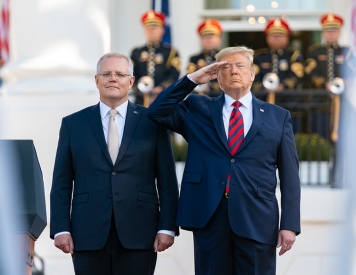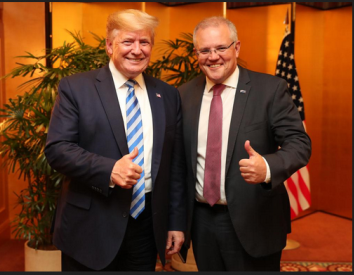The late American historian and social activist, Howard Zinn, warned us that when governments kill in large numbers they always do so for a "good reason" and we must be on guard against that.
I’m particularly on guard when it comes to Australia’s military incursions. Like you, I care about what’s going on in the world and, at some point in your life, you have to decide what responsibility you have to others.
When I started writing opinion pieces on various issues many years ago, it quickly became clear to me that vigorous debate in Australia is encouraged only within the limits imposed by "unstated doctrinal orthodoxy", particularly in relation to foreign policy.
People who control what we know today are determining our future. The historical record is vital to understanding our time but difficult to access if it even exists, so I decided to focus on government documents to tease out the omissions and backstories.
When information comes from the inside there are fewer gaps and the government can’t deny it — it has to deal with it. When information doesn’t come from the inside you rely on inference and supposition from the outside to fill in the gaps, and then it’s easy for the power holder to deny and to ridicule your conclusions.
Syria seems to me to be a contemporary illustration of Australian historian Chris Clark’s stated conclusions in his book, Sleepwalkers: how Europe went to war in 1914. He concluded that great powers had more than one enemy, that there was a chaotic quality of decision-making by executive structures, and that the war was a consequence of decisions made in many places with their effect being cumulative and interactive — decisions made by a gallery of actors who shared a fundamentally similar political culture. It was – and in Syria now is – genuinely complex and multipolar.
On 9 September 2015, the Permanent Representative of Australia to the United Nations, Gillian Bird, wrote to the President of the United Nations Security Council claiming that Article 51 of the Charter of the United Nations recognises the inherent right of the states to act in individual or collective self-defence where an armed attack occurs against a member of the United Nations. States must be able to act in self-defence when the government of the state where the threat is located is unwilling or unable to prevent attacks originating from its territory. She alleged that the Government of Syria had, by its failure to constrain attacks upon Iraqi territory originating from ISIL bases within Syria, demonstrated that it was unwilling or unable to prevent those attacks.
The Australian Government was not questioned about how Syria was "unwilling or unable" to prevent those attacks. It was not asked how any airstrikes would affect the Syrian population and infrastructure. There was no link between ISIS, a non-State actor, and Syria as it was not acting under instructions from, or the direction or control of, the Syrian Government. There was no attempt by Western governments to work with the morally disgraceful Assad regime to actually enable it to prevent the attacks emanating from its territory (and, indeed, Australia didn’t recognise the legitimacy of the Assad regime).
There was no invitation from the Syrian Government for us to carry out airstrikes in Syria: there was no UN Security Council resolution authorising the use of force. There was no proper explanation provided by the Australian Government or the Opposition about why, in August 2015, there was no clear legal basis for Australian involvement in Syria but by September 2015, there was. There was no rational discussion about the strategic ends and there was certainly no mention of the fact that, in 2014, we already had Australian Defence Force (ADF) embedded personnel in Florida contributing to the execution of operations against IS in Syria.
There was, however, a letter dated 17 September 2015 from the Government of Syria to the UN Security Council, which was not reported in the mainstream media but was referred to in documents I received. It disputed Australia’s "unwilling and unable" claims and pointed out that the Syrian Arab Army had, over a period of four years, been fighting IS, the al-Nusra Front and others who were being supported by Turkey, Jordan, Saudi Arabia, Qatar and western states, and called on others to coordinate with them. It went on to say that the international coalition, led by America, had yet to achieve anything tangible in its war on terrorist organisations.
And the Syrian Government had a point, particularly when former President of the United States Barack Obama had already told VICE News (on camera), in March 2015, that
“ISIL is a direct outgrowth of Al Qaeda in Iraq that grew out of our invasion in 2003, which is an example of unintended consequences.”
But what were the conditions of the choices to join airstrikes in Syria? What did the Australian Government know or at least, what should it have known? These are the omissions about what was really going on, the backstory.
The Australian public, via the Government and the media, were made aware before September 2015 that:
- 15 boys were detained and tortured for having written graffiti in support of the Arab Spring;
- pro-democracy demonstrations had erupted in Syria demanding Assad’s resignation;
- the Assad Government was accused of using chemical weapons in August 2013;
- we rejected the presidential election in 2014;
- a terrorist state could emerge if IS consolidated its gains in Iraq from its base in Syria;
- Syria was the worst humanitarian crisis facing the world at that time;
- there were multiple conflicts involving different players, including the Assad regime and numerous rebel groups with different objectives, and different regional and international backers; and
- a political solution was needed.
In the second half of 2014, the Australian Government was rightly swept up in the global concern for Yezidi civilians trapped on Mount Sinjar to escape ISIS, remembering that we helped to create ISIS courtesy of the invasion of Iraq in 2003. The public was told that the RAAF would be dropping aid to the Yezidi, that we would be delivering rocket-propelled grenades, mortars and various calibres of ammunition from eastern European countries to the Kurdish Peshmerga fighters in northern Iraq. This would be done to combat the spread of ISIS on the back of an assurance provided to the Americans that the weapons would be used by the Peshmerga forces of the Kurdish regional government. The ADF chief, Mark Binskin, said, “the greater risk here is actually doing nothing”.
We began airstrikes in Iraq in October 2014.
One wonders what the Yezidis would now make of our politicians’ public displays of outrage and concern about their plight when so many Yezidis remain on Mount Sinjar where they fled, women and children are still being held captive for brutal sexual slavery and, to date, there have been no known, large-scale rescue missions to free them. Sinjar town remains in ruins and a new wave of fighting for Sinjar district is under way between the Peshmerga and other Kurdish armed groups. In keeping with the doctrine of "cold violence", Defence Air Task Group statistics confirm that no humanitarian aid deliveries have been dropped since 2014 and only 3,532 people of the promised 12,000 persecuted minorities have been resettled in Australia with an aid budget that has been cut to its lowest level in our nation’s history.
What was omitted from the political and public discourse in the lead-up to our decision to become involved in Syria was the fact that Syria had experienced a severe drought between 2007 and 2010, spurring as many as 1.5 million people to migrate from the countryside to the cities and creating significant social and economic tensions. In 2012 the MI6 had cooperated with the CIA on a “rat line” of arms transfers from Libyan stockpiles to the Syrian rebels after the fall of the Gaddafi regime. That same year, Russia proposed that Assad could step down as part of a peace deal but the U.S., Britain and France were so convinced that the Syrian dictator would fall that they ignored the proposal.
At that stage, the United Nations had confirmed that 60,000 had been killed in Syria between March 2011 and November 2012 [current estimate is almost half-a-million].
In September 2014, the U.S. Congress determined that the $500 million CIA program to arm Syrian rebels had failed, with arms ending up in the hands of the al Nusra Front and Jordanian intelligence officers selling off arms on the black market.
The following month, a CIA report concluded that
‘...many past attempts by the agency to arm foreign forces covertly had a minimal impact on the long-term outcome of a conflict.'
In March 2015, 21 international aid agencies and human rights groups released their report ‘Failing Syria’, which found that the UN Security Council powers had failed to alleviate the suffering of civilians as the conflict intensified. Two months later, the International Crisis Group released its report warning that military aid had been given without an underlying strategy, which would prolong the battle with IS as well as inflaming other local conflicts between intra-Kurdish rivals.
In August 2015, rumours started to emerge that Australia's then Prime Minister Tony Abbott had pushed for the U.S. request to join airstrikes in Syria. Five days before the bipartisan decision was made, Amnesty International had reported that 220,000 people had been killed in Syria, 12.8 million were in need of humanitarian assistance inside the country and 50 per cent of the population had been displaced.
Still, at a reported cost of $500 million a year for our air war against IS and regardless of international law, we were first in with the United States — beating our British counterparts, who had delayed plans for a parliamentary vote.
A number of military strategists were of the view that our involvement was a show for the domestic audience.
The irony, of course, is that six days after the decision was made to conduct airstrikes in Syria, we had a new Prime Minister and, shortly after that, a document titled ‘ADF Operations in the Middle East’, produced in response to my Freedom of Information request, confirmed that ‘the prospects for a political or military solution are poor’.
The use of the word "poor" seems highly inadequate when looking at Syria under the microscope.
You have:
- Saudi Arabia (a Western ally) and Qatar providing clandestine financial and logistical support to IS;
- Iran and Russia supporting Assad;
- Turkey fighting the Kurds;
- the U.S. supporting opposition groups but fighting with Russia against IS;
- drone strikes, bombs being dropped by the United States, Belgium, Jordan, Netherlands, Bahrain, Saudi Arabia, United Kingdom, France, United Arab Emirates, Turkey, Israel, Denmark and Australia;
- the Pentagon relying on an army of contractors from military giants to firms linked to organised crime to supply arms to Syrian rebels, as well as evidence of the al-Nusra Front having access to sarin gas.
And to top it off, a Bulgarian journalist recently uncovered Azerbaijan Silk Way Airlines offering diplomatic flights to private companies and arms manufacturers from the U.S., Balkans, Israel, and the militaries of Saudi Arabia, UAE and U.S. Special Operations Command, to ship weapons around the world, including to Syria, without regulation.
Australian politicians talk about ending terrorism but they make decisions that carelessly or inadvertently stir the pot and radicalise people, which reinforces the public narrative and makes military incursions superficially acceptable.
Our politicians continue to support an ally that has historically forsaken the exploration of peaceful means and diplomatic solutions in favour of force and aggression. Under the pretext of “decency and force”, humanitarian concerns and the responsibility to protect civilians we extended airstrikes into Syria.
But "every war is a war on children" when armed conflicts kill and maim more children than soldiers and perversely more soldiers die from suicide and peacetime incidents than war.
This article is an excerpt from a speech by Kellie Tranter at the Sydney Democracy Network, Sydney University. You can read the full speech here.
Kellie Tranter is a lawyer and human rights activist. You can follow Kellie on Twitter @KellieTranter.
Monthly Donation
Single Donation
Ask questions. Subscribe to IA.











